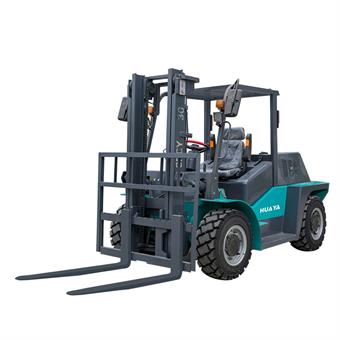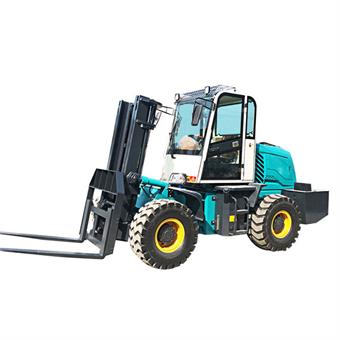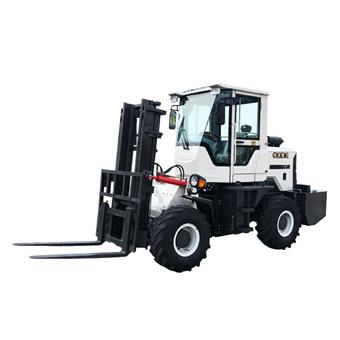
Actualités
Qu'est-ce qu'un chariot élévateur tout terrain? Dans le domaine de la manutention, ces machines polyvalentes sont les maîtres de l'adaptabilité. Conçus pour naviguer sur des terrains difficiles, qu'il s'agisse de chantiers ou de paysages accidentés, les chariots élévateurs tout-terrain redéfinissent les possibilités de déplacer efficacement des charges lourdes.
Cet article se penche sur les complexités des chariots élévateurs tout-terrain, en explorant leurs caractéristiques, leurs applications et la valeur inégalée qu'ils apportent à diverses industries.

Les chariots élévateurs tout-terrain sont des machines spécialisées conçues pour fonctionner dans des environnements divers. Contrairement aux chariots élévateurs traditionnels, ces véhicules robustes sont dotés de caractéristiques qui leur permettent d'affronter facilement les surfaces inégales, les terrains accidentés et les pentes raides. Équipés de pneus robustes et de systèmes de suspension améliorés, ils garantissent stabilité et contrôle, même dans des conditions difficiles.
Ces chariots élévateurs sont disponibles en différentes tailles et configurations, pour répondre aux besoins spécifiques des différents secteurs d'activité. Qu'il s'agisse de construction, d'agriculture ou de sylviculture, les chariots élévateurs tout-terrain constituent une solution fiable pour soulever et transporter des charges lourdes dans des environnements exigeants.
Lorsqu'on envisage d'acheter un chariot élévateur tout-terrain, il est essentiel d'en comprendre les principales caractéristiques. Ces machines sont généralement équipées de :
4 roues motrices : Assure une traction optimale sur les surfaces irrégulières.
Garde au sol élevée : Permet de franchir facilement les obstacles.
Pneus robustes : Conçu pour la durabilité et une meilleure prise en main.
Flèche télescopique : Permet de soulever et d'atteindre des obstacles.
Construction robuste : Construit pour résister aux conditions difficiles.
Les chariots élévateurs tout-terrain jouent un rôle essentiel dans le secteur de la construction, où le paysage est dynamique et difficile. Leur capacité à naviguer sur des terrains accidentés garantit une manutention efficace des matériaux, contribuant ainsi à l'achèvement des projets dans les délais impartis.
Dans les milieux agricoles et forestiers, ces chariots élévateurs sont indispensables pour des tâches telles que le chargement et le transport d'équipements lourds, d'aliments pour animaux ou de récoltes. Leur polyvalence dans la navigation à travers les champs et les zones boisées en fait des atouts inestimables.
Pour choisir le bon chariot élévateur tout-terrain, il faut comparer les différents modèles et leurs spécifications. Des facteurs tels que la capacité de levage, la portée et la maniabilité sont des éléments essentiels à prendre en compte. En outre, l'évaluation des exigences en matière d'entretien et des accessoires disponibles peut influer sur le coût total de possession.
L'entretien d'un chariot élévateur tout-terrain est essentiel pour assurer des performances optimales et une longue durée de vie. Des inspections régulières, des réparations opportunes et le respect des protocoles de sécurité sont primordiaux. Les opérateurs doivent suivre une formation approfondie pour manipuler ces machines spécialisées, afin de garantir un environnement de travail sûr.
L'évolution des chariots élévateurs tout-terrain se poursuit avec des innovations constantes. Les progrès technologiques, y compris l'automatisation et la télématique, promettent d'améliorer l'efficacité et la sécurité. Il est essentiel pour les entreprises de se tenir au courant de ces évolutions afin de conserver une longueur d'avance dans le paysage concurrentiel de la manutention.
La demande de chariots élévateurs tout-terrain augmentant, le choix du modèle adapté à vos besoins spécifiques devient primordial. Prenez en compte des facteurs tels que la nature de vos activités, les conditions du terrain et la capacité de levage requise. Consulter des experts et des concessionnaires réputés permet de prendre une décision éclairée qui correspond aux objectifs de l'entreprise.
R : Bien qu'ils soient principalement conçus pour être utilisés à l'extérieur, certains modèles peuvent être utilisés à l'intérieur. Cependant, leur grande taille et leurs caractéristiques robustes peuvent ne pas être idéales pour les espaces confinés.
R : Oui, les chariots élévateurs tout-terrain sont généralement plus chers en raison de leur conception et de leurs caractéristiques spécifiques. Toutefois, leur polyvalence et leur capacité à affronter des terrains difficiles justifient l'investissement pour les industries qui ont besoin de telles capacités.
R : Les chariots élévateurs tout-terrain nécessitent un entretien régulier de leurs systèmes de suspension, de leurs pneus et de leurs composants hydrauliques. L'utilisation dans des environnements difficiles augmente la probabilité d'usure et de détérioration, ce qui rend les inspections de routine cruciales.
En conclusion, les chariots élévateurs tout-terrain sont des atouts indispensables dans de nombreux secteurs, redéfinissant les normes de manutention. Leur conception robuste, leur polyvalence et leur capacité à naviguer sur des terrains difficiles en font la solution idéale pour les tâches qui exigent précision et efficacité. Au fur et à mesure que la technologie progresse, ces machines évolueront probablement, améliorant encore leurs capacités et leurs applications.
Que ce soit sur un chantier de construction, au cœur d'une forêt ou dans de vastes champs agricoles, le chariot élévateur tout-terrain fait ses preuves et assure la manutention des matériaux avec facilité et précision.
Investir dans le bon chariot élévateur tout-terrain n'est pas seulement une décision pour aujourd'hui, c'est une décision stratégique pour assurer l'avenir de vos opérations de manutention.


